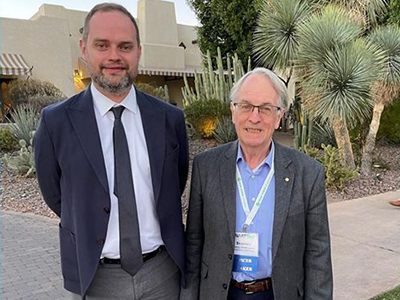
Electra, Glencore, and Talon partnering with governments on battery materials park study
Mike Edwards
People in Process battery technology Glencore plc Ontario At the NAATBatt 2022 event in Litchfield Park, AZ, Electra VP, Commercial, Michael Insulan met with M. Stanley Whittingham, winner of the 2019 Nobel Prize in Chemistry for his work in developing lithium-ion batteries. Image courtesy LinkedIn.
At the NAATBatt 2022 event in Litchfield Park, AZ, Electra VP, Commercial, Michael Insulan met with M. Stanley Whittingham, winner of the 2019 Nobel Prize in Chemistry for his work in developing lithium-ion batteries. Image courtesy LinkedIn. Electra Battery Materials Corp. of Toronto has announced the launch of a battery materials park study in partnership with the Governments of Ontario and Canada, Glencore plc and Talon Metals. The consortium will collaborate on engineering, permitting, socio-economic and cost studies associated with the construction of a nickel sulfate plant as well as a battery precursor cathode active materials (PCAM) plant adjacent to Electra’s cobalt refinery and recycling plant.
The realization of this vision would said to result in the creation of North America’s first integrated, localized and environmentally sustainable battery materials park for the electric vehicle market.
The $950,000 study will be funded by the government and the three participating companies, with the provincial government contributing C$250,000, federal government contributing, matched by a $250,000 investment from Electra and C$100,000 each from Glencore plc and Talon Metals.
The study aims to facilitate construction of North America’s first battery grade nickel sulfate facility, prioritizing domestic, low carbon raw materials. Glencore is one of the world’s largest nickel producers and Electra’s refinery is located two hours from the Sudbury Basin, one of the world’s largest sources of low carbon nickel. Talon Metals is developing the high-grade Tamarack nickel-copper-cobalt project in central Minnesota under a joint venture with Rio Tinto.
The study also targets construction of much-needed North American precursor manufacturing capacity, which would yield significant cost and carbon footprint advantages through integration with refining operations. Electra is in discussion with several PCAM manufacturers and intends to partner with an established producer for this last piece of an integrated and domestic battery materials park.
Battery materials produced from this site are anticipated to have an exceptionally low carbon footprint, due to reliance on renewable hydroelectric power and proximity to feed materials and end markets.
Electra is pursuing a four-phased approach to build North America’s first battery materials park, with a battery grade cobalt sulfate refinery to be commissioned in December 2022 and a battery recycling circuit scheduled for 2023, followed by battery grade nickel sulfate and PCAM by mid-decade.
The objective of joint study is to assess the technical, financial, and permitting requirements for the construction of a battery grade nickel sulfate refinery and a PCAM facility located near the company’s hydrometallurgical facility in Ontario. Emerging best practice in the electric vehicle supply chain is to co-locate chemical refining and PCAM production on a common site to eliminate conventional processing steps, resulting in lower unit costs, a shorter supply chain and a smaller carbon footprint.
“We are excited to partner with the Government of Ontario, Glencore, and Talon on this Battery Materials Park project,” said Trent Mell, CEO.
“We are pleased that the Government of Canada supports our vision of an integrated battery materials park, bringing together chemical refining, battery recycling and cathode precursor production as a means of establishing a world class battery supply chain with an ultra low carbon footprint. The Federal Government has been one of our biggest champions and we are grateful for their support with this collaborative five-party consortium working to build out the missing pieces of the North American battery supply chain.
“Ontario is home to North America’s only battery grade cobalt refinery, an abundance of nickel and clean hydroelectric power. Together we can leverage Electra’s existing footprint and the Government of Ontario’s ambitions to build a world class battery supply chain in the province. The Government has been one of our biggest champions and we are grateful for their support.”
“Canada is home to an abundance of nickel, North America’s only battery grade cobalt refinery and clean hydroelectric power. The goal is to leverage Electra’s existing footprint in order to bridge North America’s mineral wealth with a growing domestic EV production base, completing the onshoring of the entire electric vehicle value chain and reducing vulnerabilities on foreign supply,” Mell adds.
Michael Insulan, VP Commercial added: “Partnering with Glencore and Talon on this study provides a clear path towards subsequent implementation of the Battery Materials Park project. Glencore’s position as a global powerhouse in the battery materials sector provides the possibility for immediate raw material feed for the proposed nickel sulfate plant whereas Talon’s nearby Tamarack project is well positioned to become one of the most important nickel suppliers in the western hemisphere. It is essential for a low-carbon future that we process these materials to battery grade specification in North America.”
The parties have committed to collaborate on engineering, metallurgical work and other studies. Future collaboration among the parties will be subject to the results of this project and further commercial discussions.
Electra is in discussion with PCAM producers in Europe, Japan and Korea, several of which are assessing expansion opportunities in North America. One or more PCAM companies may participate in this study at a future date.
Electra recently commissioned CRU, an independent commodity research company to estimate the potential carbon emissions from Electra’s proposed nickel-sulfate refinery. The study found that carbon emissions from a Chinese nickel sulfate operation relying on Indonesian raw material feed would be up to three times higher than material produced in Canada. The same report highlights the imminent need for North American cobalt sulfate, nickel sulfate and precursor capacity to keep pace with the rapid build-out of cell manufacturing on the continent.
“There has been insufficient scrutiny of the nickel supply chain, particularly the very high carbon footprint associated with producing battery grade nickel from nickel laterite deposits, but that is starting to change,” said Mell. “The low carbon North American alternative that we are proposing is much more compatible with the transition towards zero-emission vehicles to lower global greenhouse gases.”
Funding for this study is the second investment made by the Government of Ontario in support of Electra’s business activities, following a C$5m grant from Ontario to fast-track the restart of the existing refinery complex. The study will be completed in phases, with results expected in Q3 and Q4 2022.
Electra’s business strategy is to produce sufficient battery material to supply 1.5 million electric vehicle batteries on an annual basis. The Company’s cobalt sulfate facility is on schedule to be commissioned in 2022. The cobalt plant will be the first in Electra’s four-phase Battery Materials Park project. In coming years, Electra intends to build further processing capacity for nickel sulfate, recycling of primary and secondary battery scrap materials and precursor production.
Print this page
